IN THIS ISSUE
FEATURE: MUSICAL OPs

RESEARCH: MACHINE LEARNING IN SPORT
STAFF PROFILE: DENNIS STRONG
CAREERS: STARTING A CREATIVE BUSINESS



FEATURE: MUSICAL OPs

RESEARCH: MACHINE LEARNING IN SPORT
STAFF PROFILE: DENNIS STRONG
CAREERS: STARTING A CREATIVE BUSINESS


For Old Perseans who learned to swim in the murky waters of the River Cam, the construction of The Perse swimming pool, climbing wall and sports centre may seem like a luxury. However, in true Perse fashion, this will be a ‘best value’ building which, whilst architecturally stylish, will be functional and heavily used. Being married to a paediatric intensive care doctor, I know first hand that the ability to swim is not a luxury but a vital life and life-saving skill. When the pool opens in the autumn of 2024, it will provide important opportunities for Perse pupils and children across Cambridgeshire to learn to swim. The building will also enhance our outdoor pursuits and sports programmes by providing new opportunities for canoeing, climbing and a plethora of indoor sports which will aid pupil wellbeing and personal development. The indoor sports centre will quickly become our most heavily-used facility and a key means by which The Perse delivers public benefit to the wider community. Income from hirings

will also assist school finances as we navigate the current cost-of-living crisis and prepare for potentially challenging times ahead with political talk of VAT on fees and loss of charitable tax reliefs.

Independent schools are great survivors and in The Perse’s 408-year history we have coped with various financial shocks, outbreaks of plague and a direct hit from a World War II bomb. Survival isn’t by luck but by design and we are already giving careful thought to how we could manage any changes to the School’s charitable status and tax reliefs. A week is a long time in politics and much could change before the next General Election, but, as befits a school with a long scouting tradition, we will ‘be prepared’ for all eventualities. Knowing we have the support and encouragement of alumni is a great source of strength as The Perse delivers an excellent academic, pastoral and extra-curricular education to its pupils so they can make the future better.
With best wishes,
Ed Elliott
Perse Sixth Form actors and singers performed the spectacular musical rendition of the much-loved romantic comedy Legally Blonde in the Peter Hall Performing Arts Centre. Izzy Bevens (Upper Sixth) and May Busher (Lower Sixth) shared the starring role of Elle Woods, a young woman who applies to Harvard to defy stereotypes about her appearance and become a successful lawyer. To master a particularly challenging number with skipping and singing at the same time, the cast were given a special skipping workshop by Helen Petrovna (2006), who played the character of Brooke in the UK tour of the production.
Lynden Long (Year 8), playing for Norwich City’s youngsters, won the Ateitis Cup in Vilnius, Lithuania. Usually captaining the Championship club’s U13 team, Lynden was playing up a year in a mixed U14/U13 Norwich side team. The competition consisted of 40-minute 11v11 matches, in which Lynden scored a goal in a 4–0 triumph over Estonian side Flora Tallinn before Norwich eventually beat Metta Riga in the final. Lynden said: “It was a brilliant experience and it was the first time I’d won a tournament abroad.”
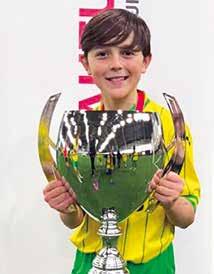
Cheyoon Kim (Year 10) and Sissi He (Year 9) secured a place in the finals of the International Competition for Young Debaters after taking fifth place in the regional round at The Cambridge Union. The pair won two of their four debates, successfully arguing for imposing a 100% inheritance tax as well as banning social media influencers from featuring children in their content. Reaching the final was a particularly impressive achievement, as this was Cheyoon’s first in-person event and Sissi’s first debating competition in any form. Cheyoon said:
“There were so many good teams taking part. We just came for the experience for future competitions and didn’t expect to get to the final.”
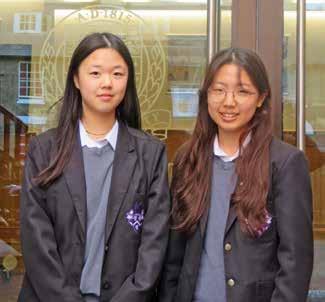
The work on building a new swimming pool and sports hall for Perse pupils has officially begun on the Long Road field at the Upper and is set to open in autumn 2024. Head Ed Elliott and Bursar Alison Shakespeare dug the ceremonial first hole on the project together with officials from Willmott Dixon, the contractors for the complex. The School’s aim is to ensure that the building has a high level of energy efficiency to receive a BREEAM ‘excellent’ accreditation. As part of the School’s commitment to community benefit, the six-lane 25-metre swimming pool, sports hall and climbing wall will also be available for public use.
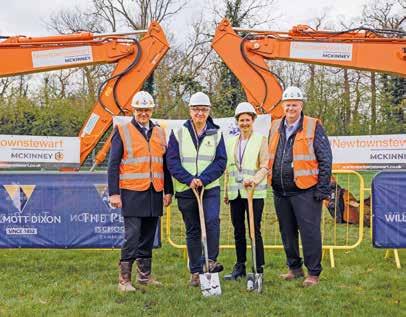

Hongli Hu, Yulin Chen and Kiran Diamond (all Upper Sixth) made it through to the second round of the annual UK Chemistry Olympiad, a competition open to all secondary schools involving written tests, training and assessments on a variety of chemistry topics. The students’ knowledge about rocket fuels, electronegativity, amino acid complexes and many more topics was tested and each were awarded a Gold. Hongli Hu (Upper Sixth) was also the highest ranked Perse student in the British Biology Olympiad (BBO). He qualified for round two of the BBO, but chose to prioritise the UK Chemistry Olympiad due to a clash in dates. Juliette Brooking (Lower Sixth) and Imogen Rainey (Upper Sixth) were the second and third highest-placed Perse students respectively in the BBO.

This year’s Perse Aristotelian Award winners were Woodford County High School for Girls pupil Shravani Bacchu and Perse pupil Lili Angus. This essay competition is open to Year 9 pupils across the country, with the aim to inspire students to develop independent research skills. Shravani won the sciences category with her research on whether her favourite science fiction film The Matrix could become possible in 20 years. Lili won the arts/humanities category for her investigation on whether history is written by the victors. Perse Head of Research Matt Fox was thrilled with the level of interest in the competition and the standard of entries. He said: “We were delighted so many students across the country wanted to take part and experience the process of doing some research.”
Five Old Perseans tell us about how their interest in music developed after leaving The Perse.
I STUDIED AT The Perse between 2010 and 2015. I was in the first year group where girls were accepted below Sixth Form, and I joined in the first mixed Year 9 cohort. I quickly became acquainted with the School’s thriving co-curriculum, spending most of my time inhabiting the music department; playing and singing in every ensemble I could feasibly manage, as well as enjoying stage performances in the school musicals. The music department was a second home to me. It was an incredibly supportive place for me to hone my skills as a musician. I owe so much of my career to my music teachers at The Perse, especially Viv Halton, my wonderful saxophone teacher, Ben Wingfield, who taught me A level music and led several ensembles I loved performing with (most notably the Acapellicans) and Gavin Richards (or Gavlaar as we fondly called him – much to his dismay!), who always made my GCSE and A level music classes great fun.
After leaving The Perse, I went on to study classical saxophone performance at the Guildhall School of Music and Drama. During my time there, I was able to play brilliant music with so many like-minded people and it helped shape my playing into what it is now. Since graduating in 2019, I have been working as a freelance saxophonist and singer, as well as a peripatetic woodwind teacher at several schools around London.
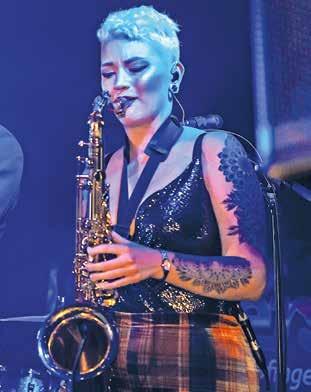
As a freelance saxophonist, my work is varied. In the last year alone, my job has included playing at music festivals, recording sessions, jazz clubs, club nights, playing for television, corporate events, weddings, big band performances, free improvisation performances, Afrobeat gigs and hip hop shows. I really enjoy the great variety of events and musical genres that I’ve been lucky enough to be able to play in recent years.
In January 2022, once live music had begun its comeback post-Covid, I started my own local acapella choir in Walthamstow, called the E17 Singers. It has been great fun to direct and organise a large group of singers weekly and a lot of the opportunities I was given in music ensembles at The Perse helped me have the confidence and knowledge to do this. I’ve recently been putting more of my focus as a saxophonist on Afrobeat and jazz, which are both genres I enjoy. Some of my recent performance highlights have included playing at the Vortex Jazz Club with the London Jazz Orchestra, the London Jazz Festival with (Im)Possibilities, Metaverse Music Festival with Amadis and the Ambassadors and MC Solomon’s recent UK tour which finished by headlining the Going South festival. Looking ahead, I’m really excited for all my future gigs and recordings later this year!
www.sophieburrowsmusic.com
@sophieburrowsmusic
I LEFT THE PERSE in 1996 to study experimental psychology at the University of Oxford. I’d been in a couple of dodgy bands at school, where my ability to play by ear was of surprisingly little value. The highlight of that part of my career was a gig in the Sixth Form Centre! At university, my musical ambitions began to take off. As well as playing in cover bands to get into college balls for free, I joined my first proper originals band. I spent most of my twenties playing in various bands, with differing degrees of commercial success. The final one of these, called Envy & Other Sins, self-released singles on vinyl through independent labels and accidentally won a Channel 4 TV show searching for “the next great British band”. This resulted in a major label record deal and an album release. It suffices to say the British public proved less convinced of our greatness than the judges on the TV show and it’s not clear that the judges were terribly convinced.

When we decided that Envy & Other Sins had run its course, and as I needed to get a mortgage, I decided to put what I’d learnt as an independent
musician to use and began working as a tour manager. I got my first gigs by contacting every tour manager I could find on the internet and asking them if they needed any help. Most of my early gigs were with UK rap artists like Kano, Sway and Chipmunk. I travelled the world tour-managing various artists, most notably Nero and Rudimental. This was quite interesting, but also stressful. I was permanently jetlagged having visited over 25 countries a year, some more than once. I also worked as a music director and ran a small record label founded by a tech entrepreneur called Mike Adam. The industry was not very digitally advanced, so I started a tech company to build “Touring Machine” – a tech platform for the management of tours.
I was fortunate enough to have built a strong friendship with Mike Adam and we decided to (re)build a technology company, which became Amigo Technology. It had nothing to do with the music industry! I worked there as Chief Operating Officer for eight years. We sold the business at the end of 2022 and I am now working on a fintech start-up, as well as advising high-growth businesses on scaling rapidly. In a bit of a homecoming, I am currently working on a project with a successful, London-based visual effects company that is building an arm offering music services for the advertising industry.
I have never received a job offer on the basis of my CV. My entire career has resulted from the relationships I have built with the people I have met, being open to new opportunities and being willing to take risks.
I AM CURRENTLY WORKING ON A PROJECT WITH A SUCCESSFUL, LONDON-BASED VISUAL EFFECTS COMPANY THAT IS BUILDING AN ARM OFFERING MUSIC SERVICES FOR THE ADVERTISING INDUSTRY.
IF THERE’S ONE thing that I absolutely made the most of during my time at The Perse, it was the music department, all of its facilities, teachers and performance opportunities. It was a safe bet for any teacher wondering what could possibly be more important to me than attending my timetabled games afternoon, risking having my finger broken by a shortsightedly competitive peer, that I could most likely be found seated at a piano, improvising in a practice room.
Between the three instruments I was learning and my nascent ability to turn up on time to choir rehearsals (and sing in tune too!), I was heavily involved in several concerts each term and once even volunteered for a Saturday detention in order to make the point that it was unreasonable to expect sports teams to be able to conscript musicians away from key rehearsals at will. I am still very proud of that.
Therefore, neither the considerable enthusiasm I had for more recognisably academic fields, in particular maths, science and languages, nor my motivation to ‘achieve’ a place at an Oxbridge college alongside a large chunk of my cohort, could tempt me away from a career in music.
Instead, upon leaving The Perse in 2002, I completed my degree not at a college, but at the University of Surrey, on the Tonmeister course in music and sound recording. There, while continuing to develop my performance on saxophone, bassoon and piano, as well as composition, I was studying recording techniques and audio engineering, together with enough underlying maths and science to satisfy my academic itch. Surrey also offers free language lessons to all students and so up until the second half of my final year, I attended weekly Italian classes, just because I could. My Italian soon overtook the French I had enjoyed learning at The Perse and I maintain it regularly today, having many Italian friends in both Italy and London through a surprisingly large portion of the jazz musicians I meet and play with.
While in the professional training year of my degree, my employer took me along to a big band he had joined. There, I began my networking with professional jazz musicians, writing a large amount of big band repertoire and finding my composition and arranging voice.
After graduation I trained as a secondary classroom teacher. I learned a lot about organisation, communication and presentation, as well as how different people live and what it’s like to be a child in all sorts of circumstances. However, after a few years it was very clear to me that school teaching wasn’t for me.
In the decade or so since leaving the classroom to work as a full-time musician, I developed a strong interest in the culture of India through cinema and Bollywood. This interest led me to learn how to perform some of the songs I had been hearing and
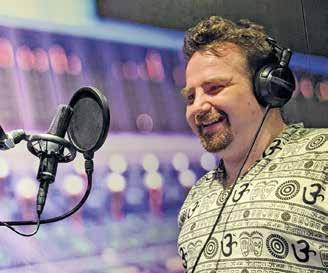
to that end I began learning Hindi. I networked with Indian musicians in London, amateurs at first, with a symbiotic exchange of my musical expertise for their knowledge of the repertoire, language and culture. This gave me the confidence to move in professional circles as well and in 2018 I joined Botown, a band that fuses the vocals of famous Bollywood songs with the funk, soul and disco grooves of equally famous Western hits. This year, we will be working in schools in Leicester for a week as part of the Spark Festival and then supporting Apache Indian (if you remember him then you’re roughly my age) on his upcoming tour.
First though, I am about to make my third visit to India in just over a year. I made two visits to Karnataka in 2022 where I made many friends, especially some wonderful musicians, and sought to create more opportunities to work in the various music scenes in India. Perhaps one day I will complete the circle and get involved with Bollywood, where my initial interest began.
On my previous visit, I met with Bangalore star Raghu Dixit after I got his attention with some jazz covers of his songs. I had done these covers chiefly to help me learn Kannada in the same way that exploring and learning Bollywood songs has helped get my Hindi to an already very useful level. I can’t yet say where that will lead or how soon, but I also met with film composer and bandleader Yashwanth Nag from Hyderabad. We have become great friends and have already worked together on the music for one Telugu film. We also shot a short version of what could be a very exciting Kannada film about the creation of a song written by another musician I befriended, Gali Durugappa, in Hampi. This song, about the local area, became the anthem for my first visit to India as Gali and I were travelling all over the area performing it together. It’s the first Kannada song I learned to sing, and I even have two bars of it tattooed on my arm (in tenor clef for the bassoonists) with the words “ಸಂಗತ
which means “the music is very good”.
@saxbend
I NEVER SET out to conduct choirs and certainly never imagined a career where I’d meet TV celebrities, work with famous composers, travel the world adjudicating choir competitions, perform with rock bands, or get winked at by a member of the Royal family during a concert – true story.
I began singing aged eight, in a local church choir in Saffron Walden. I met Sam Smith there recently to record on their latest album (they also started out singing in a church choir, did you know?). Singing in the church choir was where I learned to read music –the number one essential skill for any conductor.
I loved singing and by the time I took GCSE music, I had twice been a finalist in the Choir Boy of the Year competition. Even though there were many opportunities within music at school, I was the only one in my year to take A level music. Oneto-one lessons with Mr Cooper gave me a uniquely personalised grounding in music theory and history, as well as teaching me about harmonisation, orchestration and composition – further vital conductor skills.
During my final year at The Perse, I auditioned for the National Youth Choir of Great Britain and was accepted. It was there I gained my first experience as Assistant Conductor, later returning as a tutor and Guest Conductor.

As much as I loved singing and making music, I began to realise my special strengths were in organising people and leading the music. By the time I started my first job (a ‘gap year’ post at St Paul’s Cathedral School), I’d already founded two new choirs. Then, after a stint working for the BBC in their sheet music archives, I finally ‘quit the day job’ to work with choirs full time.
One of the choirs I started, called Chantage, won the BBC Radio 3 Choir of the Year competition in 2006, setting off a wave of TV bookings, including a series of appearances on The One Show, performing on an Elbow album live from Abbey Road, and a premiere performance in the BBC Proms at the Royal Albert Hall which featured in Classic FM’s top 10 performances for the season.
Working with composers to perform and record new music is really exciting and it’s such a privilege to interpret a first performance, whether for a classical album or a film soundtrack destined for the big screen, or for something really unusual such as football chants for the Lionesses or barbershop-style satellite navigation instructions.
For a job where I spend most of my time with my back to the audience, it certainly is both varied and rewarding and I recommend it to anyone determined enough to try it.
www.choirfixer.com @ChoirFixer
www.facebook.com/ChoirFixer
I STUDIED THE organ at The Perse under Silas Wollston before applying for an organ scholarship at the University of Oxford. I began my studies there last September and am currently the junior organ scholar at Exeter College, Oxford, accompanying the choir for services. The choir is one of the few Oxbridge college choirs which are completely run by the organ scholars with no Directors of Music. This means that the organists, including myself, have a direct role in the life of the chapel, being responsible for the termly music list, the organisation of concerts and tours and the general promotion of the choir. Therefore, as the junior organ scholar, I am responsible for the weekly organ recital series at Exeter and have also directed the choir for a number of services – a role which is invaluable for a keen conductor. I am currently taught the organ by William Whitehead and choral conducting by Benjamin Nicholas.
FOR A JOB WHERE I SPEND MOST OF MY TIME WITH MY BACK TO THE AUDIENCE, IT CERTAINLY IS BOTH VARIED AND REWARDING AND I RECOMMEND IT TO ANYONE DETERMINED ENOUGH TO TRY IT.
MUSIC AT THE PERSE has grown significantly in recent decades and was recently highlighted as one of the main strengths of The Perse Upper experience in a parent survey.
Our vision is for music-making to be something that inspires and delights pupils in equal measure. We aim to be a school where music really is for all. While any pupil can benefit from The Perse musical experience regardless of their ability, we also want our most excellent musicians, including our numerous scholars (many of whom are members of national ensembles), to be constantly challenged and motivated by working at the highest level. We have been honoured to welcome a range of professional musicians to coach our pupils, including Peter Donohoe CBE, Joanna MacGregor CBE, Roderick Williams MBE, Nicky Spence and Joseph Middleton.
The department has achieved strong curricular success, with 100% of pupils achieving the top grade 9 in the 2022 GCSE results. Pupils have received offers to study music at top institutions, such as Oxford and Cambridge, including both organ and choral scholarships, in recent years.
Two Perseans are currently playing in the National Youth Orchestra and several are involved with the National Youth Choirs of Great Britain. One Prep pupil, Francesca He (Year 6), recently had the chance to perform violin at Carnegie Hall and Paris’ Cité de la Musique.
As well as celebrating our top musicians, there are a series of competitions that involve mass participation. The annual ‘House Song’ competition,
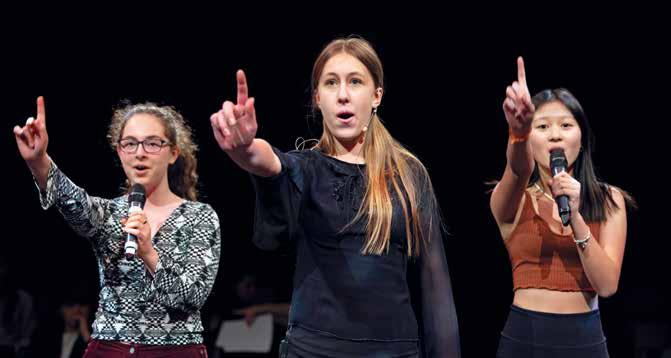
‘Persevision Song Contest’ and ‘House Music Marathon’ ensure lots of musical fun is had by all. Pupils are also involved in organising musical events for charity, including the annual Perse Cabaret, Lip Sync Battle, and this year a celebration of musical theatre called One Night Only
OUR MUSIC SCHOLARS and Sixth Formers are involved in giving back through music. Year 11 pupils help to mentor Year 3 pupils at the Prep and this year our Sixth Formers helped coach 90 Year 5 pupils from partner primary schools The Bellbird Primary School and St Alban’s Catholic Primary School to sing in preparation for a collaborative performance of Carmina Burana at Saffron Hall. Take a look at our Youtube Channel, The Perse School Cambridge, to watch a film about the project.
Thanks to the support of donors, we are able to work with Fen Ditton Primary School to provide small-group music tuition to their Year 4, 5 and 6 pupils, who would otherwise not have an opportunity to learn an instrument.
If you would like to find out more about our music partnership programmes, please email perseado@perse.co.uk.
My primary source of data are automatic captures from TTNet, released by OSAI. I use Tokyo 2020 Olympics and Tischtennis Bundesliga (German table tennis league) data, which include men’s and women’s singles matches. Potential features include player rank and in-match statistics, such as percentage of points won on serve and receive, stroke and error types. Match progression was plotted for each set, recording the location of each ball bounce (Fig. 1).
Sophie Chiang is a former national junior table tennis champion with an interest in computer science and maths. In this Rouse Award-winning project, she investigates how machine learning could predict table tennis match outcomes.
Table tennis is a quick and highly technical sport, requiring players to respond to an incoming ball trajectory within milliseconds. Rallies are intense, with ball speeds of 60–70mph and rotational speeds of 9,000rpm. The proximity between players is lower compared to similar sports, such as tennis and badminton. The outcome of a game is influenced by subtle factors, which can be hard for a human to recognise. Machine learning methods are used frequently in other sports, such as tennis and football. Proposed applications involve improved training efficiency and result prediction. Specifically, result prediction is of high concern to sports fans, but little has been done in table tennis prediction. While manually collected and analysed data sets have been available in the past, it’s only recent developments in multi-class event spotting and small object tracking that made accurate, detailed in-game data attainable.
My research proposes using this freshly available data to train and evaluate state-of-the-art classification algorithms on both men’s and women’s professional singles matches and to extend the application field in this direction, through rigorous evaluation of existing models. I also present a set of additional features that increase model accuracy, as validated in an ablation study. The results can serve as a baseline for future table tennis prediction models and can feed back to prediction research in similar ball sports.
To reduce the dimensionality of the problem, a rally was represented as the location of the winning shot. Each half of the table can also be split into nine equal sections, and the location of winning shots can be grouped (Fig. 2). I also take similar approaches in tennis to engineer features in table tennis. Table 1 (overleaf) shows a full set of features, with * indicating self-derived features.
To compare the performance of different model predictions, I calculate the accuracy of each model:
where tp and tn are true positives and true negatives, and fp and fn are false positives and false negatives respectively to each match. To get a more balanced idea about model performance, I also computed F1
SP percentage of total points won on serve
RP percentage of total points won on receive
LRP percentage of total points won on a long rally
SRP percentage of total points won on a short rally
FHP percentage of total points won on a forehand
BHP percentage of total points won on a backhand
RANK player ranking
RANKDIFF* difference in rank between opponents
SA* player serve advantage
SRA* player short rally advantage
FHA* player forehand advantage
BALANCE* measure of how well rounded a player is
scores, which considers evaluation metrics such as precision and recall:
Machines (SVMs) compared to other models. Results of the ablation study are shown in Table 2.
The whole data set was split such that there was a training set, validation set and test set in a 72:18:10 ratio. 10% of the original data set is left out until the end (the test set) and the remaining data was split in an 80:20 ratio for training and the optimising of the hyperparameters of the model. Both accuracy and F1 score is reported for the validation and test sets. The standard deviation for each score for the validation set is reported as a basis of defining uncertainty.
I also compared accuracy and F1 score for each model that does not include any newly derived features that I had defined. All scores are lower for models that don’t use newly derived features and accuracy score is significantly lower in Support Vector
I used a brute-force grid search to fine tune hyperparameters. Parameters of the model are ones that are outside the usual training domain, e.g. the number of trees in a random forest classifier. The best combination of hyperparameters for a model is determined by whichever has the highest accuracy on the validation set. The relationship between F1 score and the number of training samples for the SVM and Logistic Regression model is shown in Fig. 3.
Conclusion
Twelve features were extracted and derived in an attempt to capture the quality of players and their opponents and results are comparable to the accuracy of state-of-the-art tennis prediction models (approx. 70% accuracy). I used libraries such as scikit-learn and pandas to build predictive models in Python, to find how accurately we can predict the outcome of a table tennis match.
Using logistic regression was found to have the best overall performance when evaluated and presented with unseen data. Furthermore, all predictive models had a higher evaluated performance when newly derived features were used in combination with data extracted from the data set, in comparison to without using these calculated features.
I would like to express my sincere gratitude towards Dr Gyorgy Denes in the computer science department at The Perse for his support and feedback throughout this project. I would also like to thank the OSAI team for granting permission to use their data for this project.
Dr Sebastian Nowozin is a machine learning researcher working as Principal Scientist at DeepMind in London. He was previously Partner Research Manager at Microsoft Research and Senior Staff Research Scientist at Google Brain.
Thank you for the opportunity to comment on the brilliant research of Sophie Chiang, who developed machine learning techniques to predict the outcome of table tennis matches. Applying machine learning methods to sports analytics is an exciting new area, and most impressively Sophie demonstrated that it is possible to predict the outcome of a match among two high-level table tennis players with 70% accuracy.
Machine learning is an area of computer science and statistics that develops methods that can learn from data. These methods are typically used when our understanding of a domain is limited. For example, it is not straightforward to accurately describe the factors that influence a table tennis match outcome. In contrast, it is easy to observe who won the match. In principle, machine learning methods allow us to learn a model from these observations and minimal assumptions. The result of this learning procedure is a prediction system that can be used to probabilistically estimate the outcome for a new match. Machine learning has a rich history spanning several decades. It is only in the past two decades, with increasing
availability of both data and computational resources, that it has become a critical technology widely applied in web search, advertising and recommender systems.
However, the application of machine learning to a new domain such as table tennis is challenging and requires a good understanding of the domain to make sure high-quality data is systematically collected. Moreover, it requires a technical understanding and great care to correctly apply machine learning software and to interpret the results, drawing conclusions that are both relevant and valid. As in other disciplines of science and engineering, a single wrong step along the way can invalidate the result and make one believe in a strong performance of the system when in fact no such good performance is present. In my 15 years as a machine learning researcher I have observed many such unintentional failures of machine learning systems and, sadly, such failures were often discovered quite late after most of the work had happened. Nowadays, the science of machine learning has matured and best practices exist but challenges remain and it is not easy to apply machine learning to a new domain.
In Sophie’s work, these challenges are all met brilliantly. Firstly, she is passionate about the sport and understands the nuances of a match. This understanding of the domain has allowed her to design bespoke summary features of the data that preserve information relevant to the match outcome. She used high-quality data collected systematically and in sufficient quantity from top table tennis matches. The set of machine learning methods is well chosen and carefully applied. The experimental protocol divides the data randomly into multiple sets in order to be able to reliably estimate the accuracy of the system. The results are interpreted in detail, including estimation of the importance of different components of her system. Such sensitivity studies are important in machine learning because the learned functional relationships are often not directly interpretable.
In her conclusion, Sophie states that automated table tennis analytics could become more widely available, including to non-professional players. In that sense, Sophie’s work is a glimpse of the future. It is quite likely that in just a few years advanced sport analytics systems, such as the one developed by Sophie, will be as commonly used as fitness trackers are used by hobbyists today, allowing dedicated players to get detailed feedback on how to improve their game.
Hugh Chatfield (2013) finished the fell running challenge Bob Graham Round in just 17 hours and 17 minutes. On the day of completion, this was the 19th-fastest known round of the 66-mile route. Hugh said: “The day was only possible, only fun, only worth it because of the others who took the time to drive, co-ordinate and communicate, cook, to run, to carry, to encourage and to tease me.”
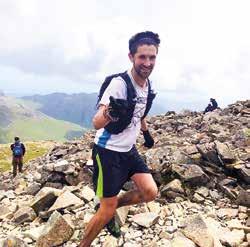
Rosie Hague (2011) appeared in Series 12 of the BBC TV series Call the Midwife, playing a young mother.
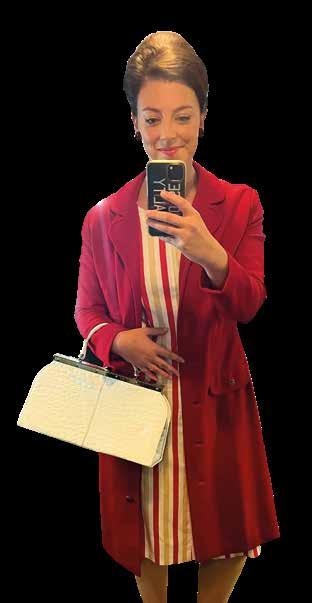

Ciaran Flaherty (2016) competed for the GB team in the 2022 Europe Triathlon Middle Distance Championships, held in Bilbao, Spain, landing at 12th place. The race consisted of a 1,900m swim, 82.5km bike and 21km run. He has also been selected for the 2023 Long Course World Championships in the 25–29 age group.
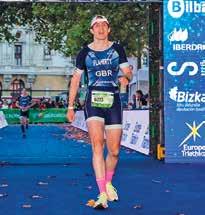
Ewan Morris (2020) was recently awarded the Bar Course Scholarship, Bedingfield Scholarship, by The Honourable Society of Gray’s Inn. This scholarship, which is the second most prestigious award that the Inn confers, will help fund Ewan’s studies to qualify as a barrister.
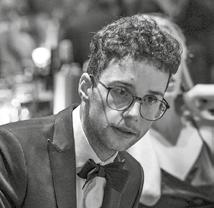
Sam Buttrey (1979) took third place in the much loved American TV show Jeopardy!: Tournament of Champions. Sam writes: “I left The Perse after Fifth Form to return to my home country, the USA. There, after university, I worked as a Wall Street computer systems analyst. In search of something different, I returned to graduate school and ended up with a job as what we call a professor, but which in the UK would probably be ‘senior lecturer’. I have been at my current job since 1996. Some time in there, I began trying out for Jeopardy! –the American quiz-show favourite whose quirk is that the contestants are given answers and are meant to discern the corresponding questions (in practice, this oddity has no real effect). I was lucky enough to be invited to the first Jeopardy! Professors Tournament in 2021, and upon winning, was invited back to the Tournament of Champions in 2022, where I finished third out of 21 entrants. I’ll have the opportunity to return at least once more in the new Masters Tournament and all of this has been spectacularly fun. I can’t help but give some credit to the broad and well-rounded educational foundation imparted to me at The Perse all those years ago.”
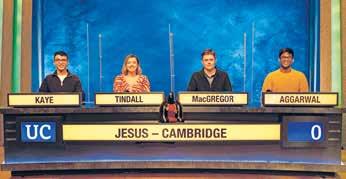

Paul Naylor (1979) has recently published the fourth edition of Great British Marine Animals. This celebration of animals that live in British seas includes stunning underwater photographs to show many interesting aspects of their behaviour.

Sarah Marshall (2021) and Brett Taylor (2020) were both named to row in this year’s Boat Race in March. Sarah raced for Oxford, while Brett competed for Cambridge, who were also crowned the winners. Meanwhile, Oliver Brunt (2022) was the youngest member of this year’s Oxford University Varsity Golf team.
James Pattinson (1998) has, together with other creatives, recently published the book [Re]Start: It’s Never Too Late – a graphic novel following the stories of seven young protagonists who are learning how to manage life’s many obstacles.

We sat down with Dennis Strong, Caretaking Manager, to reflect on his 32 years of service to The Perse before he retired in spring 2023.
What brought you to The Perse?
I was in the Army, stationed at Oakington Barracks after being trained at Bassingbourn. I met my wife here in Cambridge and we wanted children so I looked to leave the Army. It cost me £300 to buy myself out (a fair amount of money in those days) and we moved to Cherry Hinton, where we had our son and daughter. I worked for the Post Office for 10 years and then wanted a change of pace, so I started at The Perse as an evening cleaner. Over time I took on an Assistant Caretaker role under Peter Hutt, and then took over as Caretaking Manager when Peter passed away.
What is your favourite part of the job?
There are so many good things about working here – you meet all sorts of people and it’s great to get to know them. I live on site for my role, so I get to see things other people don’t see. The grounds and scenery here are amazing – you don’t get facilities like this anywhere else! My granddaughter loves coming to visit and being able to run around on the fields at weekends.
What is your least favourite part of the job?
Probably managing the car park in winter! There’s a lot of traffic in and out of the school site so it needs to be marshalled. It’s not so bad in the spring and summer, but gets very cold in the winter.
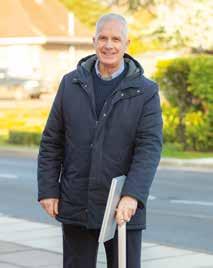
How has the school changed since you joined?
I joined The Perse in 1990, so quite a lot has changed! We’ve got so many more buildings now – classrooms, sports hall, Peter Hall Performing Arts Centre and extensions to the music block. The school has also grown. When I joined there were only boys and we had Saturday morning school. From my perspective, there were morning lessons, afternoon fixtures and then you’d go home. That’s all changed now – there are lots of activities on Saturday evenings and Sundays, as well as renting out
our facilities externally during the week too. It’s a lot busier, so we have more staff. When I joined, it was just me and Peter Hutt, but now I’ve got a Deputy Caretaking Manager and a team of seven staff.
What is your favourite memory of your time at The Perse?
There have been some great people to work with! I remember Hugh Vodden and Bob Smith bringing me flowers to give to my wife, because they joked I never bought her any. I also have good memories of the various end-of-year pranks. I used to do overnight patrols and didn’t see or hear anything, but somehow the Old Perseans got around me! There have been a few memorable ones – hoisting things on the flag pole, creating a rubber duck pond in the quad and even setting up a staff room on the cricket pitch! They cause extra work to clean up, but you have to see the funny side. Pupils wouldn’t get away with these things now!
If you could give a piece of advice to Perse students, past and present, what would it be?
Enjoy your education. You have access to great education and fantastic facilities… but remember there’s a big wide world out there, so don’t be afraid to leave your bubble!
What’s next for you as you leave The Perse?
My wife and I have bought a house in Bar Hill to be near our family. I love gardening, so I’ll spend time doing that, as well as a morning walk every day. I’ll miss being here at The Perse, but I’m ready to go and enjoy what time I have left.
THE GROUNDS AND SCENERY HERE ARE AMAZING – YOU DON’T GET FACILITIES LIKE THIS ANYWHERE ELSE!
‘It puts a gentleman in a very frivolous and contemptible light; brings him into a great deal of bad company; and takes up a great deal of time, which might be much better employed.’
That was Lord Chesterfield in 1743, cautioning his son against playing music. Not until the 20th Century did music, in ‘the land without music’, take its proper place in a rounded education.
Perse music is first recorded in 1891 with the formation of an orchestra, which performed light music by composers now mostly forgotten. In 1905 Robert Broome was appointed music master, remaining until 1947. He trained a choir and orchestra competent to perform at Speech Day and other public functions. He also led the entire school in a weekly sing-song. By all accounts this was a popular way of letting off steam at the end of Saturday mornings, as traditional folk songs were roared out. Broome wrote music for the nativity play The Finding of the King, written by Perse master Frederick Happold in 1924. It was later published by Oxford University Press. He also composed for the concert marking Rouse’s retirement. Both scores are in the archives.

Several Old Perseans who became distinguished musicians had been encouraged by Broome, notably composer, jazz musician and music critic Spike Hughes (1908–81), Ronnie Ross (1933–91), jazz bass saxophonist who once tutored David Bowie and played on the Beatles White Album, Stephen Waters (1914–91), clarinettist with the London Symphony Orchestra and the English Opera Group, and Sir Keith Falkner (1900–94) bass baritone who made his Proms debut in 1925 and later became director of the Royal College of Music.
Hughes was not a pupil. He surreptitiously composed his first opera during Rouse’s Greek lessons. Once he was sent to Rouse for playing his violin in a maths lesson. Rouse made him play a tune for the class to sing along in Greek, then he confiscated the violin for the rest of the day. Hughes boarded in School House and Rouse allowed him to use the piano in the room next to his study, an act of generosity he came to regret. Hughes had not learned to play and simply strummed chords persistently (and inaccurately) for his opera.
David Jones joined The Perse in 1974 as a history teacher and was House Tutor at School House until 1982. He retired from teaching in 2008, but has continued at the School in his role as Archivist.
After Broome’s retirement music languished for a short time until the arrival of three new masters, F.C. Brown, Cecil Crouch and Douglas Brown. The two former were good amateur musicians who played piano duets. Douglas Brown used music to good effect in the Mummery and gave a weekly music appreciation class to the Fourth Form. His Saturday music evenings became legendary. The three masters formed the Friends of Perse Music in 1953 and invited professionals such as pianist Peter Katin, Benjamin Britten and Peter Pears to perform at the School. This was a valuable counterweight to what one OP later described as ‘abysmal’ timetabled music.
In 1967, the School appointed its first Director of Music, Graham Sudbury, with a brief to build up the department. He and his successors have ensured that music is no longer considered ‘frivolous and contemptible’.
Anne Cunningham (née Davison) left her role as Head of Art at The Perse to start her own creative business, Anne Davison Studio, in 2020. She is now a designer and artist, successfully selling her work online, through retailers and collaborating directly with a wide range of companies.
After nine years of teaching art at The Perse, I decided to hand in my notice and return to a career in the creative industries. Although I enjoyed teaching, I always felt that I had unfinished business. I had a creative business career cut short through personal circumstances and I thought if I didn’t do this now, I might not have enough energy for it in the future as I am now in my sixties.
When I ran a business before, I was a textile agent for surface pattern designers as well as a practising textile designer myself. It was a servicebased business, where I collated a portfolio of textile designs from which I sold to large fashion companies such as GAP, Macy’s and Lacoste in New York and Marks & Spencer, Tesco and Mothercare in the UK. I was also regularly commissioned to create bespoke designs for a whole variety of companies in fashion and homeware. My current business is product-based, which is a whole different industry altogether. Most of my designs start by printmaking on paper. Some I keep as original prints or collages to sell as limited edition prints, art prints and some I translate my original artwork into more commercial designs on Photoshop and develop into stationery products such as wrapping paper, greetings cards and notebooks. I sell the original prints to individuals through my website, but through Instagram I have also been lucky enough to hire out my artwork to television and film companies. I also sell at art shows and trade shows. My stationery products are now stocked by over 100 different retailers in the UK, USA and Germany.
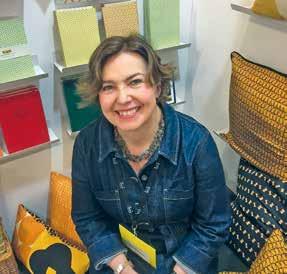
Starting a business in the age of technology and the internet has been a steep learning curve for me. ICT was never my strongest skill, and so building my own website has been a huge challenge, but thanks to YouTube, I now have a functioning website. I think many from my generation can agree that the world has greatly changed in this regard and if you want to set up a business it’s absolutely vital to learn to operate and engage with social networks, marketing platforms and websites. I would recommend some training in this area to anyone who is feeling unsure about digital marketing as it is absolutely crucial in today’s world.
Apart from getting my head around technology, there are several lessons I have learned from designing products and building a business a second time. I originally wanted my product range to cover both home and stationery, but I realised that it is better to specialise in one area for now. I may want to go back to homeware when I am more established, but the production process for fabric is less reliable than print-on-paper stock. There is also a risk of being overly ambitious, as was the case for me in the beginning. Caught up in the excitement of a new business, I wanted to have a wide range of products on sale to solidify my brand. On reflection, this may
have been a mistake because it is costly to keep multiple products in stock.
I really enjoyed teaching A level, in particular, and it was rewarding to see my students developing into the creative individuals they were through their artwork. I think this was especially evident within the subject of art because as a teacher you are so closely involved with how students are thinking, what interests them and are uniquely placed to help them develop, not only as an artist but also an individual. When I started to design and create myself, it was as if all my ideas had been incubating for a long time and came tumbling out of me. I spent three months during lockdown in my studio space doing nothing but silkscreen, lino printing and collage. I feel that whilst my students learned from me, I also learned a huge amount from them.
If I were to give advice to anyone who is thinking of leaving their profession to pursue a career in the creative industry or set up a business, it would be to practise your networking skills and to be prepared for the less creative side of running a business. To succeed in the art and design world, the most important thing is your portfolio and your ability to connect with other people. It is about understanding what would be useful for a client, because then they are more likely to use you in the future. I think that is a skill. In addition, forgetting that the creative side of being a designer or artist will get whittled away by admin and packing up orders may also be a disappointment, if you are not prepared for it.
Lastly, remember that to be an artist and designer you must stay true to who you are and always adhere to your own aesthetic. Embrace your brand and your ‘look’ – and that has to come from who you are, nobody else.
www.annedavisonstudio.co.uk
We are saddened to report the deaths of the following OPs.
Chris and Manu both worked in cancer research. They bought an apartment near Pescara and, in 2004, they were blessed with a daughter Frida. Chris reinvented himself as a freelance science writer, a role in which he built a loyal and appreciative client list. He edited hundreds of scientific papers and attended science fairs across Europe. He gained respect and admiration for his excellent work.
In his personal life, Chris loved motorbikes, real ale, Italian food and his family. He mastered spoken Italian, although his accent was always a bit dodgy!
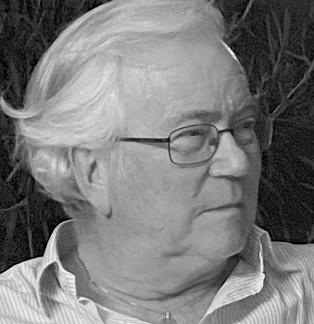
Pete Berrie (1978) writes: Chris was born in Ibadan, Nigeria, in October 1956, the third of five brothers. His father was a botanist who worked in various universities. As a result, Chris attended The Perse from 1968 to 1971, then Prince of Wales School in Freetown, Sierra Leone for his O levels and then back to The Perse for his A levels.
Chris surprised his headmaster by winning a place at Cambridge. He attended Fitzwilliam College, gained his BSc and went on to do cancer research at the National Institute for Medical Research.
While completing his post-doc at Liverpool University, Chris met Emanuela Guerra (“Manu”), an Italian who was doing her PhD. Chris fell in love and decided he was going to marry her one day. Manu completed her studies and returned to Italy and Chris devised a plan that allowed him to join her. He got an EU grant and a job at the Mario Negri Institute for Pharmacological Research that put him 200 kilometres from Manu. He commuted to be with her as much he could. They married in 1997. Chris was delighted that our dad, by then quite unwell, was at the wedding.
I’m writing this obituary as his immediate younger brother. When I was a Sixth Form boarder at The Perse, Chris sometimes “rescued” me on a weekend evening by whisking me off on his bike for a drink and a game of snooker. I was always grateful. As a young man about town, there were so many attractions that were better than “babysitting” a younger brother!
Chris was an intelligent and caring man who found his niche both in his scientific career and in his life with Manu and Frida in the Italy that he loved. He died in November 2022 after a short illness. He will be sorely missed by family, by his many close friends and by his colleagues.

Sarah Thompson writes:
My father died at the age of 76 on 17 January 2023 following a short but brave battle with pancreatic cancer. Born in Norfolk, he later moved to Cambridge and attended The Perse School from 1957 to 1965 having won a scholarship. He always spoke fondly of his time at school, particularly the opening of a passion of his… sport.
He was part of an Old Perseans rugby team and was a skilful basketball player for the Lincoln
Panthers as well as an avid squash player. Andrew wanted to give sports opportunities for everyone, so he supported Cherry Willingham Comprehensive School’s successful bid to gain sports college status in 2003. He also volunteered as a timekeeper for the Lincoln Wellington Athletics Club for several years.
On leaving The Perse, Andrew went on to study science at Cambridge Tech and, in 1967, met Susan at the Plant Breeding Institute near Cambridge. They married in 1969 before moving to Cardiff where he completed his teaching qualification. He got his first teaching job at Lincoln Christ’s Hospital School, where he taught for over 25 years. I teach at that very same school and, to this day, I have people telling me what an inspirational teacher my father was.
Andrew and Sue had two children, my brother David and I. Tragically, our mother died in 1981 leaving Dad as a single father of two. However, not only was he a man of big stature, but also had a heart large enough for us both. He went onto marry his second wife, Sharron, whom he met through teaching and their combined love of sport, and had three further children, Hayley, Gayle and Becky.
He left his teaching post wanting to wind down from the hectic life of a full-time teacher and head of subject, and took up several supply roles teaching science in Lincoln. His final teaching
role was at Bishop Grosseteste University training future teachers of science. Dad was passionate about education and the English language and always had several books on the go.
Another passion of his was art. He joined two local art groups and was particularly skilled in pencil, producing numerous pencil portraits of animals. He would save newspaper clippings with pictures that amused and inspired him, the majority of which were animals.
We held his celebration of life at Whisby Nature Park, a place that he frequently visited and held a great fondness for. He leaves behind his wife, five children and five grandchildren.
Mr Ramsbottom (Geography) and Mr Tanfield (History). Furthermore, he recalled the strictness of the Headmaster H A Wootton and the kindness of his successor Stanley Stubbs.
John kept all of his school reports, which are full of positive comments and superlatives such as ‘excellent’, ‘conscientious, ‘capable’ and ‘high standard of work’. His reports demonstrated his enthusiasm for, and ability in, his academic work and from his reminiscences he certainly enjoyed school. Although he did not participate in school stage productions, amongst his papers are the programmes for Richard II (1946), Julius Caesar (1947) and Hamlet (1949) which all, of course, starred Peter Hall.
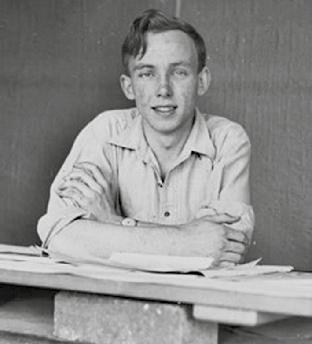
John is survived by his four children: Susan, a retired college lecturer: Chris, a retired Headmaster; Malcolm, Pro ViceChancellor and Dean of the Business School, University of Westminster and Martin, Marketing Director for a large care provider. He also leaves behind seven grandchildren and six greatgrandchildren.
Chris Kirkup writes: John was at The Perse from 1943 to 1948. Right to the last few weeks of his life he would reminisce about his school days. He could recite off-byheart, as per the register, the names of all the boys in his form group (Ady, Brooks, Cator, Cornell, Dent, Downs, Fosdyke etc). John remembered several of his teachers particularly Mr Mcfarlane-Grieve who ran the school Scout group (John was Patrol Leader of Hound Patrol) and Mr Rayner the art master with whom he shared a love of drawing. He also had fond memories of Mr Percival (Latin),
John was a scholarship boy and his parents could not afford for him to stay on into the Sixth Form. However, he went on to perform exceptionally well in his professional exams as he trained to become an architect. He worked for Middlesex County Council and the London boroughs of Camden and Bromley. He was particularly interested in architecture for the education sector and at Bromley, he was liaison architect for schools. Before retirement his final job was Assistant Bursar at University College London where he had the huge responsibility of looking after all the college buildings, both existing and new projects.
As a young man he loved riding his Lambretta and later a Norton 500. He married Sheila Dorothy Pierson in 1954 and they holidayed abroad on the Norton plus sidecar. John was an avid church-goer throughout his life and at various times was a lay preacher in the Congregational, United Reformed and Methodist churches.
John spent his final few years living in Teignmouth, Devon, a few minutes away from his eldest son. He died suddenly at the age of 90 in Torbay Hospital on 16 January 2023.
Sir Michael Heller joined The Perse in 1947, boarding at Hillel House. After completing First Form, he moved to Harrogate Grammar School. Sir Michael was admitted to St Catharine’s College, Cambridge, to read economics.
After graduating, Sir Michael qualified as a chartered accountant, working at his father’s business, KP Nuts, which was later sold to United Biscuits. Alongside this, he taught accountancy at the Sheffield College of Technology. He worked with a number of start-up businesses, and in 1971, he joined the Board of London & Associated Properties, where he was involved as Chairman until his death.
Outside of work, Sir Michael was an incredibly passionate philanthropist. Together with his wife, Lady Morven, he founded the Michael & Morven Heller charitable foundation in 1988 to support the arts, education and medicine. He championed a number of causes, including the Royal Opera House,

the National Theatre, the Jewish Museum and cancer research at University College London. In 2003, he was elected a Fellow Commoner by the Governing Body of St Catharine’s College in 2003, was awarded an Honorary Doctorate from Sheffield Hallam University in 2010 and in 2013 was knighted in the New Years Honours list “for charitable services”.
He passed away on 30 January 2023, aged 86. He is survived by his wife, Lady Morven, and their children, John, Andrew and Nicola.
Institution of Chartered Surveyors amalgamated with the Chartered Auctioneer and Estate Agents Institute, he joined Catlings as a partner and later was successfully responsible for five separate sales, management and professional offices in the city and south of Cambridge. The firm eventually joined the national Company of Countrywide Properties.
In later years he suffered various ailments which prompted his earlier retirement and to enjoy the young families of his two sons, Ben and Jonny.
There are still many who will remember him with respect and affection, sad at his passing but thankful that he did not suffer overlong.
ATC experiences at The Perse, he joined the RAF. Russell had a burning ambition to become a pilot. This was cruelly shattered for Russell, when during medicals it was discovered that he was colour blind and had difficulty distinguishing between red and green. He opted to take up training as a dental technician and was posted to RAF Marham in Norfolk. Part of Russell’s job entailed visiting various RAF outposts giving servicemen their dental check-ups.
Following the end of his National Service, he returned to the Norwich Union at Cambridge where he buckled down, determined to make a success of his chosen career path.
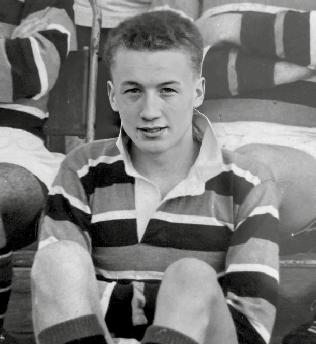
John Brady writes: Martin Green suddenly passed away on Sunday 19 February 2023, aged 77 years. Old Perseans of similar age will remember his athletic prowess as a sprint and middle-distance runner, representing the School in various triangular matches, and his success on Sports Day. While still in the Fourth Form, he first played wing three-quarter for the School’s 1st XV, streaking down the touchline scoring numerous tries during that 1960 season when the School lost only one match out of 15.
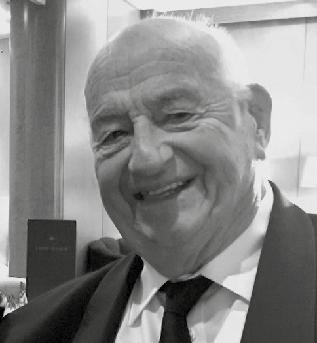
After school, he joined the Ottway Cave Tutorial College for the professions of Surveying and Estate Management. During vacations, he gained practical experience with an old local firm Catling Brady and Bliss. Having qualified with the Royal
Stephen and Ally Pointer write: Russell was born in Kent on 23 January 1931. Russell had a local primary education, but his father’s work took him to Cambridge and Russell found himself enrolled at The Perse. One of his classmates and a contemporary was Sir Peter Hall. Russell was good at cross country running and cricket, and his father paid for him to have a modicum of coaching at Fenner’s, by none other than Denis Compton CBE and David Sheppard, who both played at County level.
The School also had a thriving Combined Cadet Force and an Air Training Corps (ATC). As a cadet, when he was 15 years old, Russell was learning to fly E105 gliders. He flew solo on several occasions. Most of this was at Marshalls. Russell’s logbook showed that he had had significant flights in what are now considered iconic aircraft, such as the Lancaster, the Oxford, the Anson, and Tiger Moths. After leaving The Perse, he joined the Cambridge branch of Norwich Union.
In 1949, he was called up for National Service. Following his
Russell met and married Biddy Jane Neve, and they lived in Histon. They had three daughters. Russell was an astute hard worker and took various insurance exams. He was soon noticed and various promotions followed which took him and his family around the country. Russell retired some 31 years ago. He was a keen supporter of horseracing and both he and Biddy were members of Newbury race course, part-owning a racehorse in a syndicate with a horse trained by Nicky Henderson. He enjoyed cruising. Russell is survived by his wife Biddy, his three daughters, six grandchildren and six great-grandchildren. A life well lived.
Philippa Smith writes: John was born on 16 April 1936. He attended The Perse from 1947 to 1951. Although he didn’t attend Sixth Form like his older brothers, Bryan and James, he continued to keep in touch with many of his fellow Old Perseans – mostly those with whom he had played rugby and cricket. After leaving The Perse, John worked on the family farm and did National Service. He was also a leading points scorer for the Old Persean Rugby Club, for which he played until he was 47. John passed away on 17 December 2022 and his funeral was held on 13 February 2023 at Fulbourn Church.

Jonathan Hardy (1964)
Died 2 October 2022, aged 77 years
Malcolm George (1968)
Died 6 October 2022, aged 72 years
Anthony Kay (1958)
Died 21 November 2022, aged 82 years
Reginald ‘Drew’ Blows (1957)
Died 10 January 2023, aged 84 years
Stewart Foster (1951)
Died 19 January 2023, aged 88 years
John Lamont (1950)
Died April 2023, aged 91 years
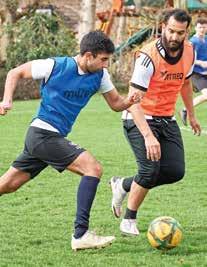
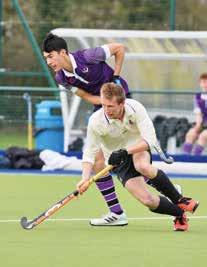

The OP Sports Festival was held on a sunny Saturday in March at the Upper. OPs were welcomed back to The Perse to show off their athletic skills and were joined by current pupils and staff in matches of hockey, netball, football, tennis and cross-country running. The day was complete with a warming barbecue at the Sixth Form Café area.

Benefactors’ Garden Party
Saturday 10 June 2023
2pm, The Perse Prep School. By invitation.
OP Cricket
Friday 23 June 2023
Play from 12.30pm, The Perse Upper School.
For more information
Please visit perse.co.uk/old-perseans/whats-on or contact the Alumni & Development Office by telephone on +44 (0)1223 403 808 or email PerseADO@perse.co.uk
Get event invitations and updates via email –update your contact preferences using the QR code below.
Old Perseans and Friends
@OldPerseans
Old Perseans
Update your Details Support Us